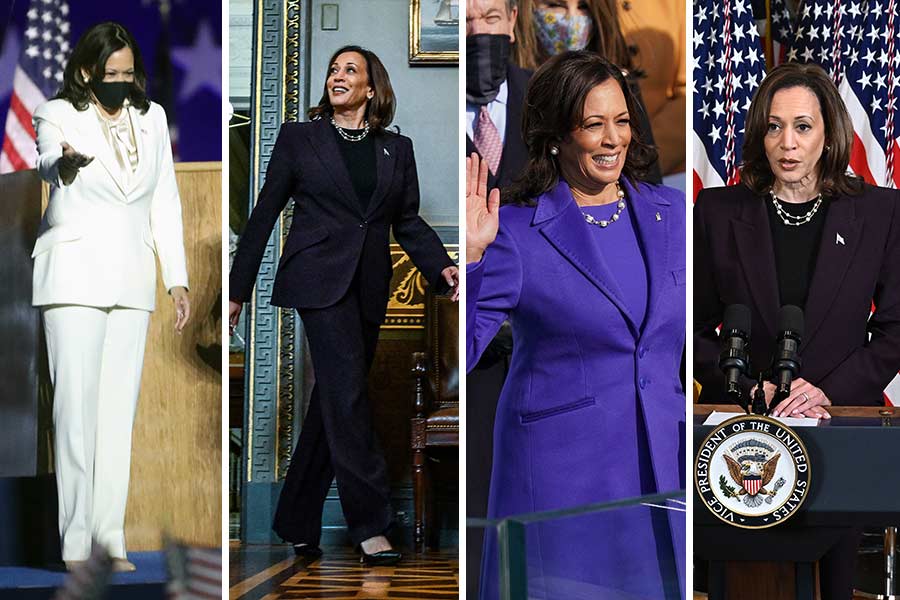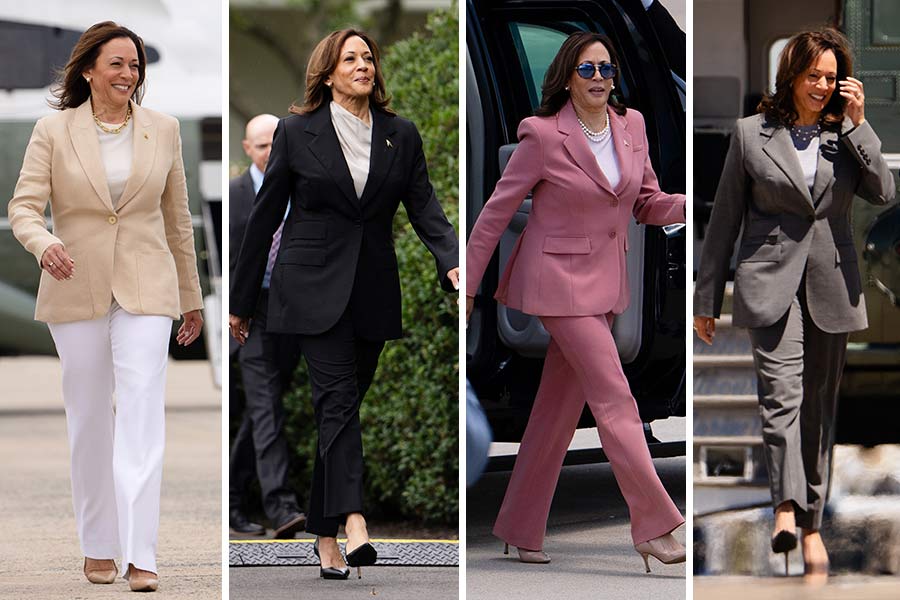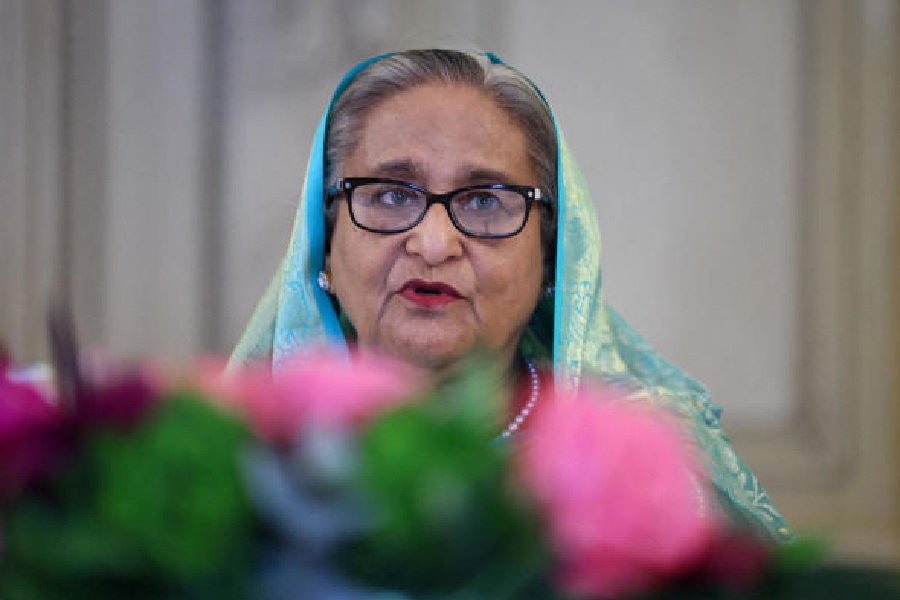Over the past week, as Kamala Harris has stepped into the spotlight as the likely Democratic nominee for president, she has done so with a high-wattage smile, a pop culture boost and a cascade of endorsements. Suddenly everything about her seems to have been electrified, except one thing.
Her clothes.
In her campaign stops in Milwaukee; Indianapolis; Wilmington, Delaware; Pittsfield, Massachusetts; and Central Florida, Harris has appeared in the neutral pantsuits she adopted as her vice-presidential uniform, in shades of black, dark blue, burgundy and beige, with the occasional jolt of salmon pink or baby blue. The rest of the world may be embracing the “Kamala is brat” meme in all of its acid green glory, but the candidate herself is not.
Instead she is wearing her usual tone-on-tone silk shells and pussy-bow blouses. Her usual signature pearls and 70-millimeter Manolo Blahnik heels. For the past four years, that was the perfect camouflage of the country’s No. 2 executive: somber, deferential, kind of dull.
But does it look presidential?
In an election in which so much about one candidate is potentially pioneering — she could be the first female president, the first female president of color, the first president of South Asian descent — that is a key question.

Vice President Kamala Harris in the first days of her candidacy for president of the United States. Photographs: Amr Alfiky/The New York Times; Kenny Holston/The New York Times; Erin Schaff/The New York Times; Kenny Holston/The New York Times (left to right)
“How you present yourself as a woman in leadership is an issue every woman in leadership has to consider,” said Ashley Allison, the CEO of Watering Hole Media and a former Biden-Harris campaign adviser. Harris, she said, “is trying to break what is potentially the biggest, thickest, largest glass ceiling there is.” How she equips herself for that matters.
It’s not really about some objective measure of chic. It’s not about being endorsed by Vogue, though Harris was. It’s about what voters read into what Harris wears; how they relate to it. Clothes become, in many ways, a stand-in for all the inchoate feelings the electorate has about a candidate, good and bad, and especially about a female candidate.
The Barbara Lee Family Foundation, a nonpartisan nonprofit focused on women in politics, has christened this factor “the imagination barrier.” When people are asked to close their eyes and conjure up a president, most of them picture what they have seen in the past: white, straight, male. Jennifer Palmieri, the former director of communications for Hillary Rodham Clinton’s campaign, said her team used to call it the TJSAH issue because it came up so often: There’s just something about her.
“Voters don’t have a stereotype of what a woman in office looks like,” said Amanda Hunter, the executive director of the Barbara Lee Family Foundation. Harris is inventing it as she goes.
Threading the Fashion Needle
Harris knows this well. She has proved herself more than able to dip into fashion symbolism when she likes: She wore three different Black designers for President Joe Biden’s inauguration, including Kerby Jean-Raymond of Pyer Moss, Christopher John Rogers and Sergio Hudson. She wore a white Carolina Herrera suit in honor of the women who came before her on the evening Biden declared victory in the 2020 election — the first time she had done so during the campaign. Her decision to stick with her suits is not a default. It’s tactical.
“We know perfectly well that she’s going to be scrutinized for her appearance more than a male candidate,” Hunter said. “We found in a study done two years ago that voters have even less tolerance for flyaway hair and a wrinkled collar for a woman candidate than a man.” They see it as a tell, an indication of sloppy thinking.
Clothes have historically been the territory of the first lady. She is the one who has been charged with using her image as a tool of soft diplomacy to reach across borders. With being relatable. With representing a local industry. Clothes, when it comes to elected office, have been used to diminish women, to make them seem less substantive than they are.
For years the solution was what might be called lady-politician garb, as popularized by such leaders as Clinton, Nancy Pelosi, Angela Merkel and Elizabeth Warren. Which is to say, a man’s suit in fruit salad colors, like a compromise made to bridge the masculine-feminine divide. It is only recently that fashion has been seized on by women themselves as a potential weapon for good. Clinton used to joke about her rainbow closet. Nikki Haley used actual dresses (and skirts and shoes) to underscore her difference from every mini-me Republican contender on the debate stage.
Harris, however, has taken a different approach.
“I call them ‘just the facts, ma’am’ clothes,” said Tammy Haddad, a former producer on the HBO show “Veep” and the president of Haddad Media. “The one key thing for any female candidate is how you walk across a stage. You want to have impact, but not too much impact. You want clothes that are flattering, but not too flattering. You want to look commanding, but not too commanding.”
If you are Harris, you want to be buttoned up, but with only one button. You want a heel, but a medium one. You want to suggest fashion without being too fashionable. The occasional dip into casual wear — Harris is a fan of Chuck Taylors — helps. As does her solution to black-tie work events (sequins), which allows her to stand out while sticking to her own sober color palette and straight lines.
What Does a President Wear?
Realistically, Harris didn’t really have a choice — and not just because the move from vice president to presidential candidate happened so quickly that she couldn’t rush out and buy a whole new wardrobe. Rather, any clear style switcheroo could have been weaponized against her, any example of flip-flopping and vanity.
“People would notice, and that would be the story,” Haddad said.
Instead Harris went for consistency, a bit of real politik that serves a variety of purposes. It is a visual refutation of the caricature Donald Trump and JD Vance have been trying to create of the crazy liberal (or Lara Trump’s comparison of Harris and a designer “trash bag”). It underscores the idea, Palmieri said, that she was “drafted,” rather than inserting herself like a pushy woman. And it’s a reminder of the last four years (for good or bad) and the way Harris looked while meeting with world leaders, or walking under the White House portico with Biden.
The attention is going to become more and more intense in the run-up to the election. Is it unfair? Yes, of course. Barack Obama acknowledged the double standard when he said of Clinton: “She had to do everything that I had to do, except, like Ginger Rogers, backward in heels. She had to wake up earlier than I did because she had to get her hair done. She had to, you know, handle all the expectations that were placed on her.”
When Clinton didn’t do it — when she stuck her hair back in a ponytail — it led to an entire discourse on the meaning of the scrunchie.
As much as possible, Harris, by wearing the same old same old, has taken fashion off the table as a talking point, the better to focus on her actual talking points. That may be frustrating to those who want her to represent … what? The country, women, Black women in a more exciting way?
And perhaps, if she won the election, her wardrobe would change to meet the moment. There will be plenty of people happy to weigh in on how that should look if the time comes, no doubt.
For now, however, it is likely she will keep her uniform, just as pretty much every candidate has before her, because, as Obama once said, it lessens the number of decisions she has to make in a day. It is fit for purpose.
Harris “seems to have internalized that idea a long time ago,” Palmieri said.
But also, what does a president wear? He wears a dark suit. Maybe in November Harris will have the opportunity to smash that barrier, too. But not yet.
The New York Times News Service











